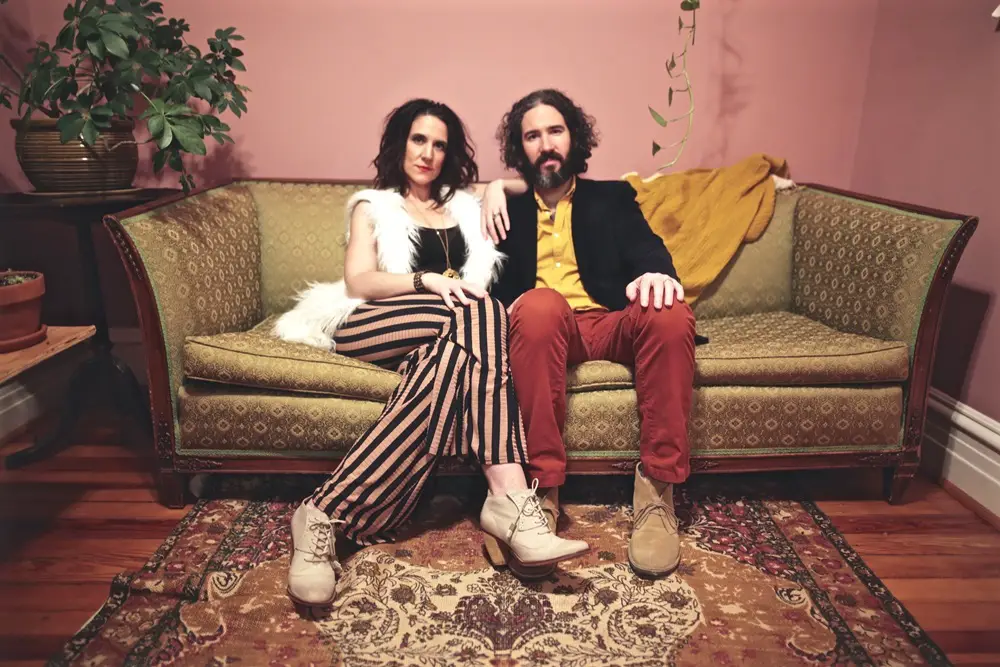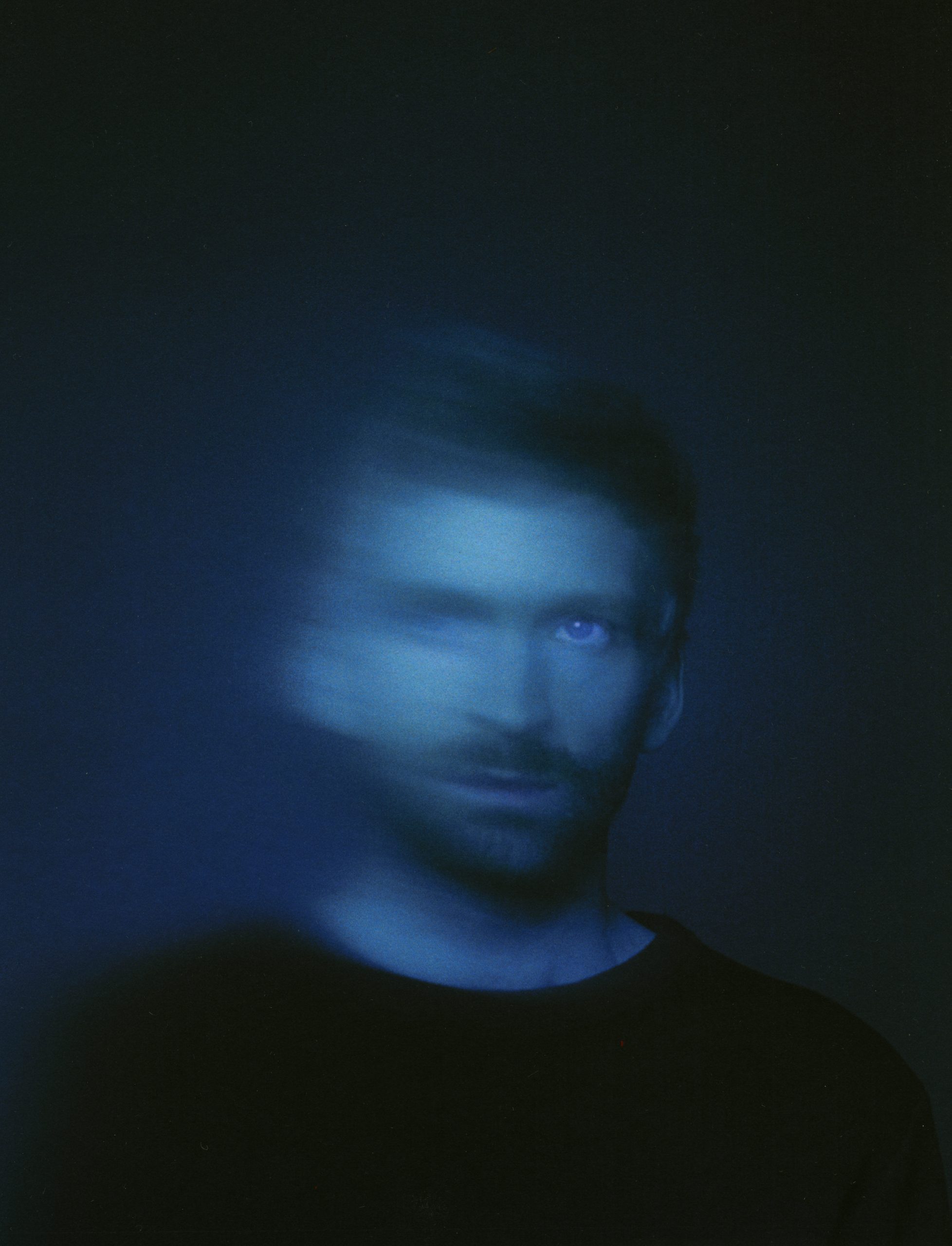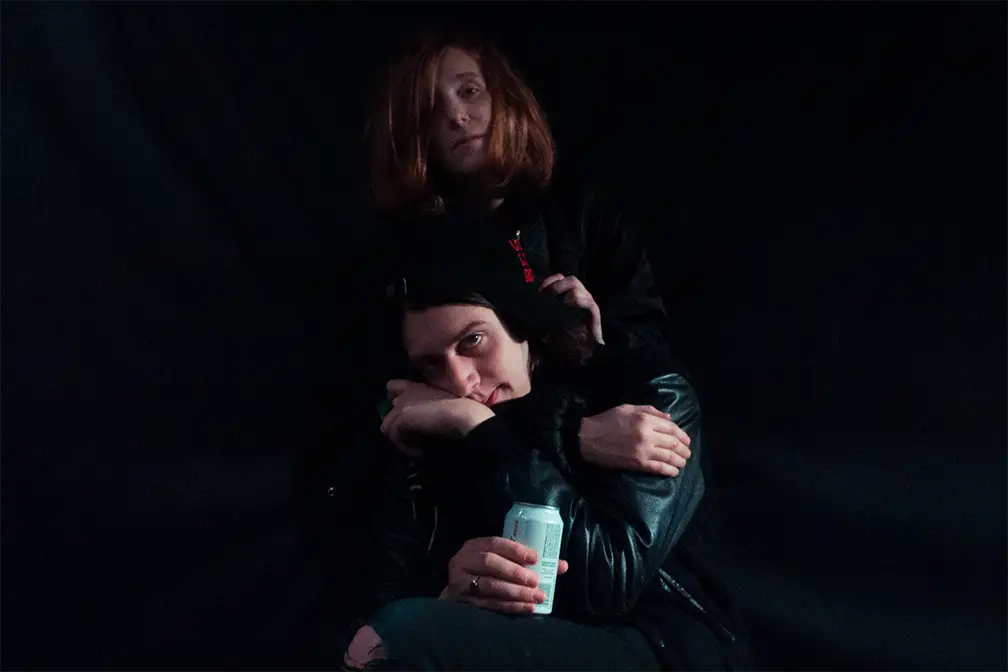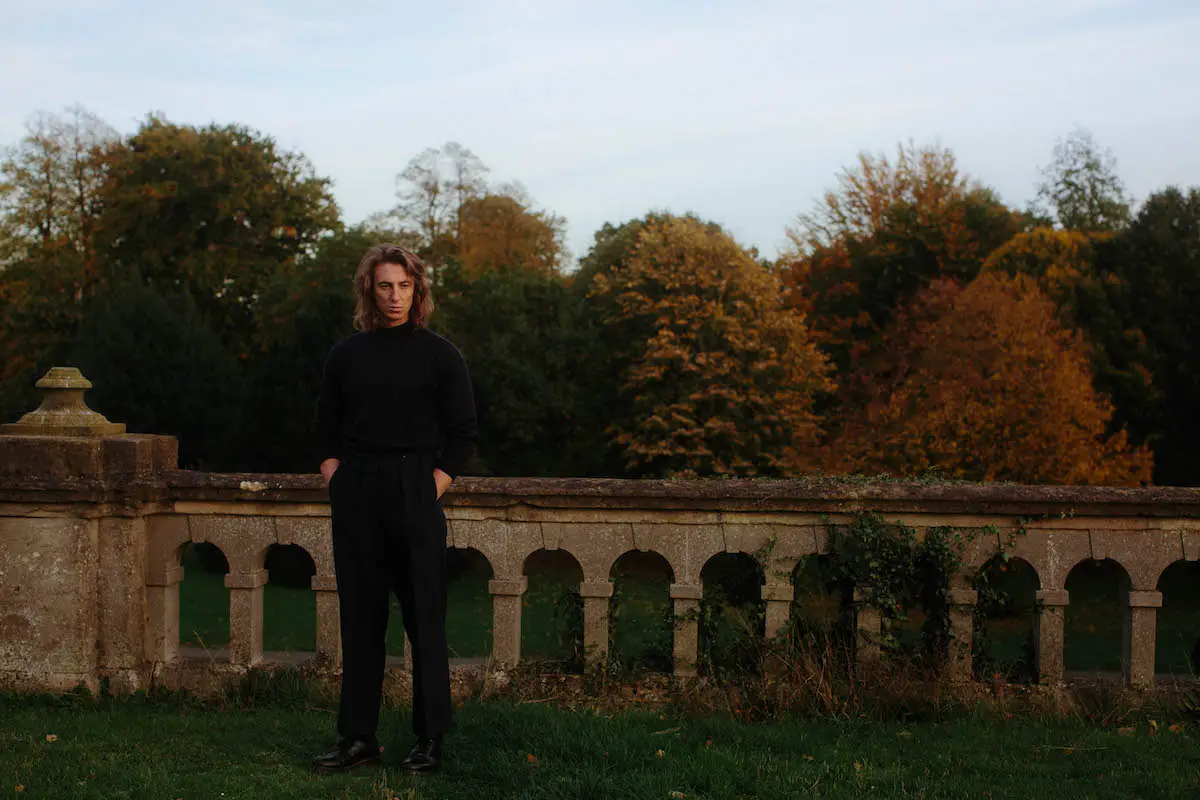An apocalyptic upheaval of seismic proportions, Daughtry’s timely single “World on Fire” soars with feverish passion. It’s unrelenting and all-consuming – and though it’s not about the global pandemic, it all-too perfectly captures the intensity (and dread) of 2020.
Stream: “World on Fire” – Daughtry
I feel like I’m chasing the energy that I’m feeling; in that moment, I really want that to transcend and make people feel something.
Chris Daughtry’s music has always hit hard, but never before has it felt this intense. Daughtry’s first single of 2020 is an apocalyptic upheaval of seismic proportions – an intense reflection of the world we’re living in, and have been living through for quite some time now. Unrelenting and all-consuming, “World on Fire” soars with feverish passion; it’s the hard rock song we all need to hear right now. Can you hear the cry like a thousand sirens?
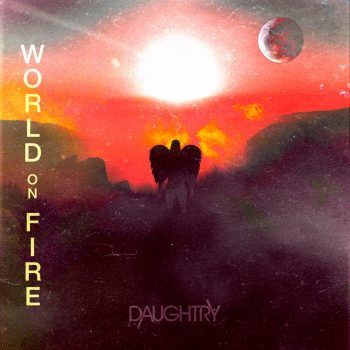
Going down like a dead man walking
One step from a body in a coffin
Just one, one of the fallen
Waking up to a blood moon, howling
Can’t drown it out, even with the medicine
Tearing through me like a bullet of adrenaline
Arms heavy, face down on a death bed
Blame the gods while choking on the violence
In the end, silence is deafening
Released August 13 via Dogtree Records, “World on Fire” feels almost too prophetic. Evoking an end-of-days fatalism, the song finds Chris Daughtry and his longtime bandmates reeling through their own cinematic Armaggedon with a slew of heated electric guitars, heavy double bass drum kicks, and the kind of calamitous imagery one would expect from a Hollywood blockbuster.
Can you hear the cry like a thousand sirens?
In the night like thunder striking
The sickness is rising
The angels are crying
That’s the sound of a world on fire
Only Daughtry isn’t pulling from some sort of fictitious imagination – apart from the angels crying, perhaps. If art imitates life, then “World on Fire” was meant to express a slice of Earth as it was back in January of 2020; in point of fact, its colorful poetry all-too perfectly captures the everyday intensity, terror, and draining truths of life during the COVID-19 pandemic.
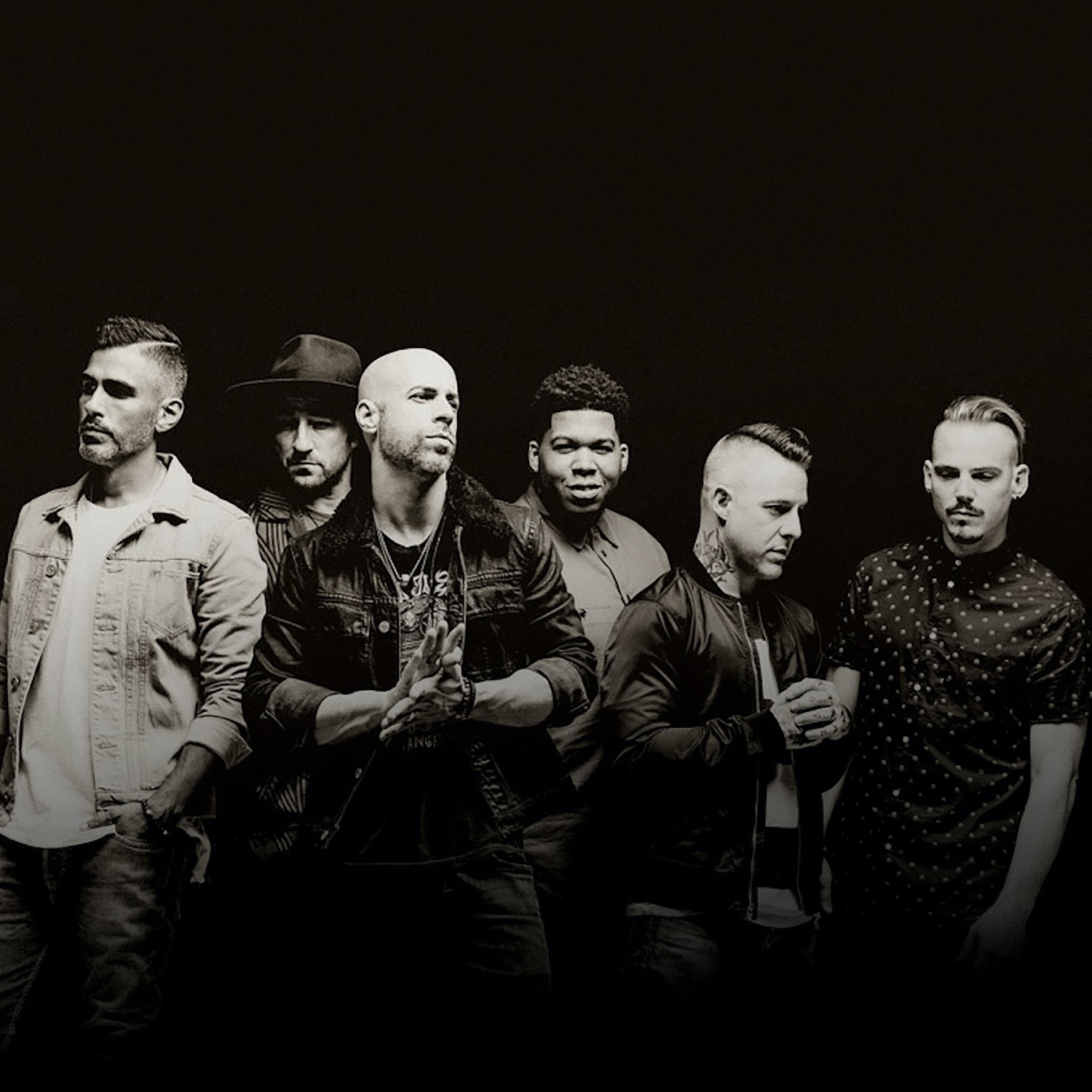
“At the time, Australia was burning, and everything we looked at on the news or Instagram, was just negative, negative, negative, and we were just like, ‘Man, the world’s on fire,'” Daughtry says, looking back on his new song. “We just went for it, and it felt real and dark and it felt like something that we were all experiencing, even then. And then the pandemic hits, and we were all like, ‘How did we do this?‘ This was all before George Floyd; there was no shortage of police brutality or racial injustice even then, so a lot of that made it into the lyrics.”
Stressed out, head trauma, took a beating
Takes more than a pill to numb the feeling
Bang, bang, no mercy for the healing
Oh, twenty dead without a fight, without a reason
Twenty more in a cop car, bleeding
All tryna win a war without a meaning
Daughtry’s first single of the year (following 2019’s standalone song “Alive”), “World on Fire” is a catchy and electrifying uproar. It sees the band unapologetically embracing a fierce hard rock sound that veers close to metal territory, and perhaps most important of all, feels organic and true to their identity. Speaking with Atwood Magazine, Chris Daughtry reflects on feelings of doubt, uncertainty, and insecurity that had crept up around the band’s recent album’s – 2013’s Baptized and 2018’s Cage to Rattle. Since his big break on American Idol’s fifth season in 2006, Daughtry’s self-titled band had been signed to major label RCA Records. They parted ways in 2018 and have relished their independence since: Not being signed means there are fewer interests at stake, and the band feel that much freer to pursue the music they want to make. They are no longer chasing the elusive “hit,” so-to-speak.
“I have full creative control right now, and I’m making the record that I’ve wanted to make for years,” Daughtry beams. “I’m not really thinking about, “Is this gonna make it on the radio?” Or, “Is this gonna be a cross-over?” I don’t give a shit anymore.”
I want the song to live where it should live, and the album to live where it should live, and that’s a liberating feeling, and I think the fans are gonna have no choice but to see the authenticity.
Can you hear the cry like a thousand sirens?
In the night like thunder striking
The sickness is rising
The angels are crying
That’s the sound of a world on fire
There’s no mistaking the timeliness of “World on Fire”: It feels fitting to have this song out to soundtrack what feels like an historic moment in human history. Yes, it’s a terrible chapter – one of sickness, senseless brutality, and far too much death; but perhaps by recognizing just how horrible things are right now, we can band together, raise our voices, and really do something this time.
“For me, ‘World on Fire’ represents a hard look at what’s going on around us,” says Daughtry. “The world is not at a lack of issues for us to deal with. I hope this song inspires people to be aware and treat each other better, eradicate division and hate by spreading kindness. I think that’s the most important thing we can do as a species.”
Do you want to see the world go up in flames? Neither do we.
And neither does Daughtry. “I wanted [my new music] to be something important, I wanted it to mean something to people, I wanted it to mean something to myself,” the artist shares. With “World on Fire,” Daughtry has done all that and more by tapping into the visceral reality that turned out to be 2020.
“World on Fire” arrives with the announcement of a 19-date virtual US “Live from Home” tour that began in mid-August, and will run through the end of September. Each show features a unique setlist, a Q&A session, song requests, and more. Furthermore, a percentage of the ticket proceeds from each respective city venue host’s website goes directly to that venue. For more information, visit daughtryofficial.com.
Atwood Magazine sat down with Chris Daughtry on a recent Zoom call to dive deep into “World on Fire” and discuss the band’s fresh headspace of “not giving a shit.” Sink into the apocalyptic vibes below, and stay tuned for more from Daughtry as they continue to embrace their well-deserved independence.
Stream: “World on Fire” – Daughtry
A CONVERSATION WITH DAUGHTRY
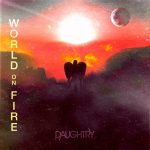
Atwood Magaizine: Chris, it’s great to connect! Now I can't start any conversation without addressing the global pandemic and the respective lockdowns. How have you and your family been?
Chris Daughtry: We’re good. Honestly, the first couple weeks was a little tough, not knowing where it was gonna go, and our tour got cancelled and I didn’t know what life was gonna look like, so it was slightly depressing and un-motivating and I had a bit of an identity crisis, it was like, “Who am I?” I’m so used to being on the road. I haven’t been home this long in 14 years, but it’s been great, getting to bond with my kids more, and me and my wife get to hang out more and do shit together, so it’s been good. I enjoy being home now. It’s a little weird, that the thought of being on a tour bus now, as much as I missed it, I’m okay with just being here right now.
Do you feel like you grew in ways you wouldn't have expected yourself to grow during this time?
Chris Daughtry: Yeah, I think so. I think it’s kind of forced me to look at myself internally more, and kinda deal with personal stuff and things like that. And with the music, it’s helped take a beat and really analyze where we’re going with this record, and we had some momentum going when we started doing the record back in October, November last year, and then we got shut down in March. So we had a good portion of it done, but there’s still a lot of work left to do, and right now we’re just waiting to see when we can all get back in the studio again. But yeah, I think it’s been great for my mental state, in a lot of ways.
It's always good to take care of ourselves every once in a while, right?
Chris Daughtry: Yeah, exactly.
Daughtry has been such a live band, ever since you came onto the scene, 14 years ago. I'm curious, do you do your best song writing in motion, and on tour? Or do you tend to need to take the step away and be home to write a record, or be in that mindset?
Chris Daughtry: I think, when we first started out, I was writing all the time on the road, and motivated to do so, always wanting to record something new. And then it got to a point where I felt like we were just cranking out garbage. And every now and then there was a gym in there, that we would end up cultivating later. But yeah, I feel like for me now, I feel like I wrote what I could write on the road, when I wrote it, and now it’s about being able to take a step back and letting life kinda integrate a little bit, before I’m able to really express that, and sometimes I need to just not write at all and just let it come when it’s time. And there are certainly times on the road where inspiration will hit and I’ll record something down on my phone, but even then I won’t revisit it until I’m in that headspace. Now, I feel like it’s creating or performing; it’s hard to combine the two.
That's interesting, I know Cage to Rattle was your fifth full length?
Chris Daughtry: Yeah, yeah.
Where do you feel this album sits in your repertoire? And looking back on it now, a few years out, what does this record mean to you?
Chris Daughtry: That was a very frustrating record to make. It took us a very long time to get that record done, there was so many moving parts that took place before we actually started with the recording process. I was living in LA, I was writing, I started writing the record. Well, we actually started when we did The Greatest Hits record, and then some of those songs bled over into Cage to Rattle. But it was such a frustrating place in my own personal life, I just didn’t know where I was or who… I was second-guessing myself a lot, I was… I didn’t know… I think Baptized was a huge departure for us, and I didn’t know…
I felt like I was questioning everything I wrote. I felt like I was doubting myself as an artist, as a writer, and I knew the records I wanted to make, but those weren’t really popping on the radio, and it was a very confusing time for me. So ‘Cage to Rattle‘, for me, was a bit of a labor of love and frustration and uncertainty. And even still, when the record was finished there was a couple songs on it that I wasn’t really jiving with, but the label was pushing on me and that kind of tainted it a little bit for me as well.
So now, going into this record, I’m not on RCA anymore, so I have full creative control right now, and I’m making the record that I’ve wanted to make for years, and I’m not really thinking about, “Is this gonna make it on the radio?” Or, “Is this gonna be a cross-over?” I don’t give a shit anymore. I’m really just wanting to make something that I’m so proud of. And I think it took those records to get me to that place, where I was like, “If I was watching myself perform that on stage right now, would I be looking at it like, ‘Oh, I’m really proud of that.’ Or am I just serving the system here? Or am I playing the game?” And it really made me take a step back and analyze who I was as an artist, and what I had to say, and I wanted it to be something important, I wanted it to mean something to people, I wanted it to mean something to myself. And so, when I started writing this record, it was such a… I don’t think I’ve been that inspired in a very long time, and so far the stuff that we’ve written and recorded has just been so gratifying to me, and I’m so proud of it, and I’m very happy that people are digging “World On Fire”, but there’s way more where that came from for this record.
Let me say, you answered about three or four of my next questions.
Chris Daughtry: Oh, sorry, I was rambling.
No, I appreciate you sharing all of that! What you're talking about in terms of feeling restricted and really second-guessing yourself resonated with me, because I feel like “Alive” and “World on Fire,” these two new tracks, they're so confident and they feel so effortless. How did these songs come about? Take me back to... You're finally independent, you're done with RCA, this is the first time in almost two decades that sort of reflects how you were at the beginning of your career. What was that experience like, being free and starting to create again?
Chris Daughtry: Well, I think, part of the self-doubt came from the fact that I would turn in stuff, and I didn’t really get a lot of excitement about it, and so I started doubting myself as a writer, and there were certainly songs on Cage to Rattle, that I just loved and was very proud of! I feel like even Jacquire King, who produced the record, he’s a phenomenal producer, I feel like he even had his hands tied. And so, when that chain was broken, and myself and RCA, we mutually parted ways, I’ve started to think about who I wanted to work with, and the songs that I wrote for Baptized… I mean, Cage to Rattle, some of my favorite songs on that record, I wrote with Scott Stevens and Marti Frederiksen, and I’d wanted to work with them for a long time, in doing a record, ’cause I felt like they got me and they understood me. And whenever I was around them, I had this confidence, like that they understood what I bring to the table, and they’re really honing in on that, and focusing on that, instead of going, “Well, yeah, but let’s think about this song that so and so’s doing, and how well that’s doing. Let’s do another one of those.” And we didn’t go into it with that mindset.
It was like, “Let’s write something that feels fresh, that feels real, and let’s not even think about radio, let’s not even think about charts.” And that was such a liberating feeling, just to know that… I have a new manager now, who’s been with me for a very long time, but now he’s my sole manager, and he’s always believed in me as a rock artist and was just like, “I don’t wanna say anything about what you should write or whatever. I want you to put out what you want to, or what feels right to you, and we’re gonna make it work.” And so I had nobody really telling me that, “Eh, that’s okay.” Except for us, we were the ones like, “Eh, I feel like we’ve done that before. Move on to the next one.” And when it came to “World On Fire”, we were going through… We were going through a list of these song starts that Scott had put together before the session, and I saw it, it was labeled Fresh as Fuck, and I was like, “What’s that one?” And he clicked it, and it was the intro, and I was like, “That, there’s something there.” And at the time, Australia was burning, there was…
This was back in January. There was no shortage of police brutality, or racial injustice even then, so a lot of that made it into the lyrics and we were just kinda like, everything we looked at on the news or Instagram, was just negative, negative, negative, and we were just like, “Man, the world’s on fire.” and we’re like, “There’s the title.” And we just went for it, and it felt real and dark and it felt like something that we were all experiencing, even then. And then the pandemic hits, and we were all like, “How did we do this?” This was all before George Floyd. And then all of that, lyrically, was there, it was like we had a crystal ball, so it was very evident to us, that that was the first single, and we really wanted to get that out to people. So at the time, the band hadn’t even performed on it. I had already done my parts and we had a skeleton basically of the production, so we sent it to the guys and they recorded all their parts at home, separately, and it worked out, it worked out great. We’ve done that on a couple songs now, but we’re certainly missing the togetherness and being in the studio.
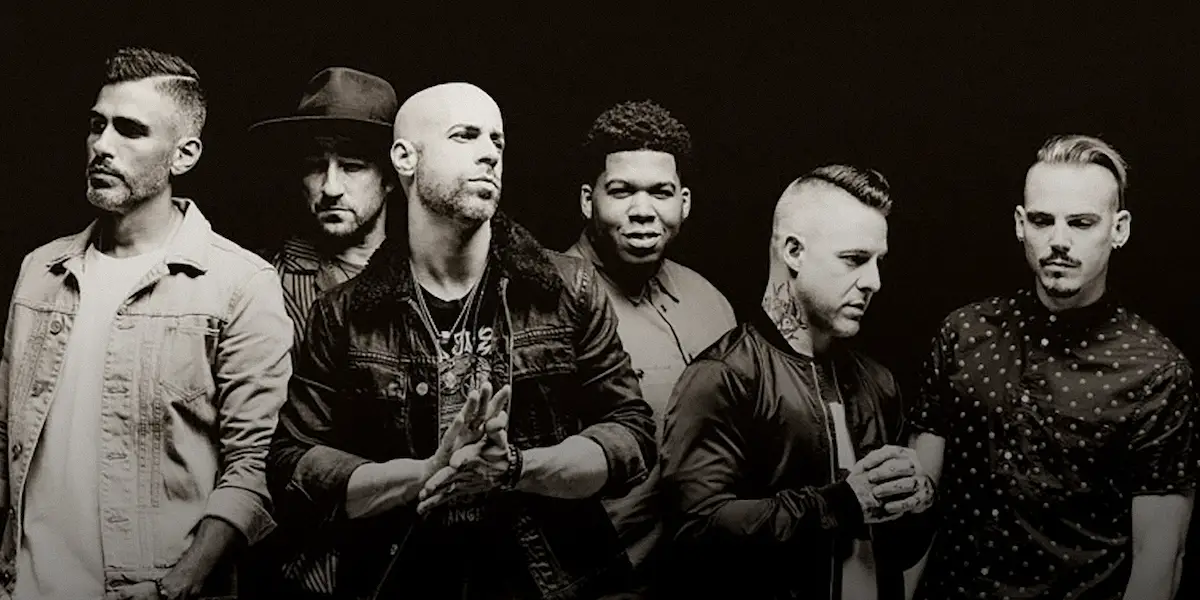
Is that a new feeling for you guys? I know there are some bands who swear by the live record, and I certainly feel this live element in your music. Have you done the recorded individual parts before for a lot of these records?
Chris Daughtry: This is the first time we’ve ever recorded separately, so it’s… It’s a crapshoot and it’s a testament to the band, those guys really did a phenomenal job, and the fact that our producer wasn’t present for any of it, it was pretty awesome how it all came together. I was shocked, the demo was so good and I was so… It’s so hard when you are married to something like that and you’re like, “That’s the perfect vision right there.” And there’s always that chance of it coming back and being like, “It just doesn’t have the same energy.” and it came back and it was even more on fire than the demo, so we were very pleased with that, and it’s encouraging to know that if things go tits up even more, that we can actually finish this record remotely.
Yeah, I hear you on that one. I really love the lyrics here, so you know, “All tryna win a war without meaning.” Your imagery of sirens, death beds, sickness rising and angels crying, it all feels apocalyptic.
Chris Daughtry: Yeah.
How did you go about capturing this apocalyptic sensation in your music though?
Chris Daughtry: I think that’s a testament to Scott and Marti, they really… It’s such a simple song instrumentally when we break it down on an acoustic guitar, but there’s so many cool elements that bring this post-apocalyptic feel that I don’t even know it was intended, I don’t even know if we were thinking along those lines when we were putting it all together and it just worked out, it was one of those things that, it was lightning in a bottle. I don’t know if the pandemic had happened before we wrote this song, there’s a good chance we wouldn’t have written it. It would have probably felt too on the nose, we would have probably been like, “Oh, that just feels weird.” There was no sickness going on in January, and there it is in the lyric, and so everybody’s thinking, “Oh man, this whole pandemic really inspired you, huh? You were in a dark place.” And I was like, “No, it all happened months before.”
Sometimes a song just really captures the moments. I was... By the intensity in this song, from the double bass to your own voice, you could say this is almost surging on metal territory.
Chris Daughtry: It has a hit, and at the same time it has this interesting operatic feel to it in the chorus. A buddy of mine, Justin from Blue October, called me the other day after hearing it and was like, “Dude, that chorus sounds so Journey.” And I was like, “I’ve never even thought of it that way, but I can hear it now.”
Where do you feel “World on Fire” fits in the Daughtry catalogue?
Chris Daughtry: I feel like to me, it’s definitely the truest we’ve been to ourselves in a very long time, I feel like it treads on those earlier records in some ways, but in a very modern way, and it just feels right to me. This feels like what we should have been putting out for the last five years, early on. But I feel like we had to go through those… I can’t blame a label or management for those records either because there’s a part of you, and as an artist that wants to experiment too and you kinda start to drink the Kool-Aid and go, “Well, maybe they’re right, maybe… I saw this band, they switched gears and it worked out for them. I saw this band, they switched gears and it worked… They were heavy and now they’re… ” But it just, for whatever reason, didn’t work for us, and I think that’s a testament to our fans, they didn’t believe that from us, and I get it. There are certainly songs on those records that I’m really proud of that maybe in the future would be kind of fun to reproduce them in a more rock vibe to see how that goes over.
A lot of folks, when they think of Daughtry they think of the first time they met you, whether it was on American Idol, or on the top of the radio in the late aughts, 2009-2010. If you were to reintroduce yourself to folks today in 2020, fresh start, new year, yada yada, new decade: Who are you now compared to who you were when we first got to know Chris Daughtry?
Chris Daughtry: I’m a much more patient, humble individual than I was even five years ago. I don’t recognize that guy at all. I go back and I see interviews or people say, “Oh, I met you then.” And I’m just like, “I hope I wasn’t a dick.” And a lot of times people are like, “No, you were great.” But I feel like I had a bit of a chip on my shoulder then, and I was… I didn’t know who I was really, and I think travelling the world has really opened my eyes up and made me a little less narrow-minded, a lot less narrow-minded. And seeing other cultures and experience in other walks of life, and just growing up. I’m 40 now, I came straight out of… I was so green when I got in this business, I didn’t have a chance to really find myself before I had to give that to other people. And so there was a lot of frustration behind it, I think I was very impatient with people, I know for a fact that I was, even if people didn’t get that vibe, I felt like the energy behind it was… Could’ve been a little self-serving, could’ve been a little arrogant. And I don’t look back negatively on it, because I feel like we all have to go through those places in life where we have to figure that on our own. And I’m just very happy that I’m in a very different place, personally, mentally, spiritually, the whole bit, since 2006.
That's great to hear. I'm glad for your journey. That's wonderful. It's really interesting, because I feel like rock music is always chasing this dragon of sorts; not to use a tired metaphor, but there's always an energy to it, that's like, ''What are you after? What are you going after?'' And we can hear it throughout your music as well, there's this longing. What do you think about, when you're making a song? What are you chasing?
Chris Daughtry: I feel like I’m chasing the energy that I’m feeling, in that moment, I really want that to transcend and make people feel something. As a kid, songs that really stood out to me, I always felt something, whether I understood the lyric or the meaning of the song, if it made me feel something, that was powerful to me. And I remember when I saw Live, back in ’97, Secret Samadhi tour, I’ll never forget it ’cause it was the moment that made me realize that that’s what I wanted to do for a living. I’d been in a band at the time, and was kind of dabbling in writing songs, but when I saw that, and that passion, and that fire, that I wish I had that whole show on video, there was no video phones back then, but it was so electric and it felt so different than hearing the record, it felt like… It felt visceral and real, and I don’t know exactly what he’s saying, but it means some real shit to him and I wanna do that, and I think I’m chasing that feeling any time I’m in the studio or on stage, I really want people to feel a connection, and to feel moved for whatever reason, for whatever that means to them, I want that to feel very real to them. And so, there’s certainly songs that I look back on, that I’m like, I don’t play those, even if people are like, “Oh, I love that song.” If I don’t feel the realness behind it, it’s hard for me to connect with it.
Do your initial tracks like “Home”, etcetera, do they still resonate with you 15 years later or are you past them?
Chris Daughtry: “Home”, ironically, I would think that that would be the one that doesn’t, and that for some reason still resonates, because I wrote that from a very real place. But much like “World On Fire”, I didn’t really know what I was talking about when I wrote it, because I had never traveled before, I had never been on the road. So I knew I was about to go on American Idol, so when I wrote that song, it was almost me kinda tapping into, “What’s that gonna feel like. Being away, I haven’t experienced that before. I can imagine it’s gonna get lonely really quick.” And that was kind of what I tapped into, and now, it means so many different things to so many different people, and I’ve heard so many different stories, and I think that is what re-ignites the fire in that song for me. When I perform it live, I know that it means something to people, I know that it’s really affecting people on a very cellular level, that I think, I can’t necessarily take credit for. And it’s almost like I was given this gift of a song that affects people in a way that I really wasn’t anticipating, and that is something that I won’t take for granted.
I think that's one of the special things about making music, when the song becomes bigger than the man.
Chris Daughtry: Absolutely. And that’s always a bonus when that happens, and it’s something that you can’t really predict.
No. But if it were to happen with “World on Fire,” what would you want people to feel? I know we talked about a more general sense, but this song specifically, what excites you about having it out in the world?
Chris Daughtry: I guess I want people to feel like they’re not alone in feeling this way, and that there is a lot of negative division and agenda going on, that I feel like we get really sucked into. And I feel like if we take a step away from that, we can actually be a part of the solution, we can be a light, and we can… I feel like anything that’s going on in the world like that, should just be a reminder that we can do better.
I like that. I talked a little bit earlier about how intense I feel the song is, and I understand that it's a testament to some of the production value, as well as the other team members who weren't necessarily in the room together. But you've talked about how you're very excited for this new chapter of Daughtry, and how some of this stuff feels like your most authentic or organic material in a long time. Is there a sound attached to that feeling yet? And when people are listening to you, what about your new music is the part that feels the freshest and the most authentically you?
Chris Daughtry: I think the fact that it’s not so reliant on electronics. It feels very organic, it feels big and huge, where the guitars are upfront. Again, I think we kind of tip-toed around that on the last couple of records just because we were scared of failure, we were scared of, “Well if have the guitars too loud, nobody’s gonna wanna hear it.” And it was a lie that I sold myself based on what I was hearing in top 40, but at the same time, top 40 is so geared towards hip-hop and pop, that it felt like there wasn’t really a place for us. So I think it was such a tough line to toe there and try to fit in that when that was never gonna happen. It just wasn’t the type of artist that we are, and I think I just had to come to terms with that, and I want the song to live where it should live, and the album to live where it should live, and that’s a liberating feeling, and I think the fans are gonna have no choice but to see the authenticity in it.
Right, it's interesting that you talk about the idea of top 40. I'm wondering if one of the benefits of going independent is that you don't really have to care too much about if a song goes to top 40 or not anymore, that you're not beholden to a major record label to shell out all the money that they put out for the recording.
Chris Daughtry: Yeah, absolutely. I look at bands like who are on RCA like Foo Fighters that don’t give two shits. They write what they write, and then I see them live, I was hanging with Dave one night, we went to see them, and I was just like, “See, that guy doesn’t care about the radio.” And it’s that that keeps them going, and they’re still cranking out great music, and I had to come to terms with that and just realize that it’s not about… My fans are gonna listen to it regardless, so why not give them exactly what they wanna hear? And why not do exactly what makes me feel fulfilled as an artist.
So we should all just aspire to be more like Dave Grohl?
Chris Daughtry: We should all aspire to be more like Dave Grohl.
[laughter]
It's freeing, it's difficult to wrench yourself from that desire that you want a song to be big. And listen, your songs are big. You've had a knack for catchy hooks pretty much from the beginning of your career. But at the same time, you're right, top 40 looks a lot different than it did 15 years ago.
Chris Daughtry: Yeah, and that was a bit of a slippery slope because when we broke out, it was top 40, top 40, top 40, and we were like, “This is gonna last forever.” [chuckle] And then when that wasn’t happening, we were like, “Wait, what are we doing wrong?” When really it was just the format, and the world is changing. And bands like Shinedown, they stuck to their guns, bands like Nickelback, they stuck to their guns, and I was like, “There’s something to be said about that.”
And that's okay. I think those who want to find you are still going to find you. There's a ton of kids out there across the country and across the world who live for rock music, and quite frankly, Daughtry is in a better place than those teens in that garage right now who are just cutting their first record.
Chris Daughtry: Exactly, exactly. So we’re very happy to be back in the rock world. [chuckle] It feels more like home.
Have you been able to feel any sort of connection to your audience, to your fans during this time in lockdown? Have you found ways of connecting to people? Whether on the internet or on...
Chris Daughtry: Yeah, I was doing… I was doing Cameo for a while, which was really cool, but this virtual tour has really been all-consuming, which has been a lot of fun in a way to connect that I didn’t anticipate, because the meet and greets are like this, where it’s… In person it’s like 30 seconds, they’re rushed in, they’re rushed out. And they’re like, “Oh, but I forgot to tell you this.” And we’re like, “Sorry.” But the virtual meet and greets, we’re shooting the shit for two minutes, and I feel like I’m actually getting to know the person and vice versa, and it just feels very disarming in a weird way. They’re even going, “I thought I would be nervous and this just feels like I’m talking to my brother or… ” And it’s really cool. That’s been great. I’ve been doing… I did a couple live streams on Instagram, I’m really terrible about staying consistent with livestreams because I’m such a spur of the moment kind of guy that if I feel like, “Oh, I feel like Imma a do a cover right now.” I’ll do it now. And then nobody’s there because it’s… Nobody know… [chuckle] They’re all at work or nobody knew to check Instagram at the time. So I gotta get better at that, but yeah, even lately, the virtual tour has kept us really connected a lot.
I love the virtual tour and I like the venues that you're supporting, 'cause a lot of them are smaller venues that a lot of artists had to go through in order to get to bigger stages, right?
Chris Daughtry: And we were one of them.
The Mercury Lounge is a go-to industry space in New York City’s downtown. If there's a showcase of some kind, you're highly likely to be playing there.
Chris Daughtry: Yeah, and I think it’s cool man, these venues… Us artists need them, the community needs them. We know how important they are to the community and the people that work there, and everybody’s… We’re not oblivious to the fact that people are out of jobs right now and are struggling beyond belief. And we just thought, if there’s a way to do this, if there’s a way to do this city to city, how can we figure out a way to partner with these venues and bring revenue to these venues and hopefully try to keep them in business as long as possible, and so… And that’s just us, we’re only one band. I wish more bands were doing it because it’s pretty scary to see, to not know if there’s a light at the end of this tunnel yet and I know there will be, we just don’t know when. And it just feels so out of reach at this point, and this was the least we could do to help, it would be really cool if we were able to actually go to these venues and perform with people at a distance, but there’s so many variables right now.
And it's terrible, because LA's Satellite Club shut down for good.
Chris Daughtry: Oh my God.
Yeah, and that's bound to be happening more and more, so anything that we can do to save those venues and support them at this time is important, right?
Chris Daughtry: Absolutely.
Let me switch gears back, and just closing this conversation. A new era of Daughtry is starting, this is extraordinarily exciting times and I can feel it from what you've been saying about how much this music means to you. What are you most excited for moving forward with these songs?
Chris Daughtry: Getting to perform them live, and Download Festival next year, I can’t wait. We’ve been wanting to get on that festival for a long time, just really hoping that 2021 comes through. [chuckle] It’s got to. We all need it.
I couldn't agree more. But at the same time, what I've been seeing from various setups, it is nice to be able to connect over the internet that way and I'm hoping that the two can live simultaneously where artists can connect to their fans at any moment, wherever they are in the world, but then also travel to them and see them live.
Chris Daughtry: Which would be amazing. Yeah. If anything this has shown us that we could actually do more to engage with our fans, even when we’re out there on the road, so yeah. We’re excited for the future.
So do you think you'll be ready to get back out on the road when the time comes, or is it gonna be tough to leave home again?
Chris Daughtry: It’ll be tough, but at the same time, the excitement will be inevitable. Seeing the guys again, and just that feeling of being on stage and hearing the amps and… It’s hard to beat that.
Yeah, I can't imagine that computer speakers do the same thing for you.
Chris Daughtry: No, no, I can’t imagine ear pods either, but it’s crazy how much… You don’t realize how much of the energy you feed off of from the crowd until they’re not there. [chuckle]
They're not there yet, but they're in wait.
Chris Daughtry: Yeah, exactly.
Well, listen, Chris, I really appreciate your time today. Thank you so much.
Chris Daughtry: Thank you, man. It was so good to talk to you!
— —
— — — —

Connect to Daughtry on
Facebook, Twitter, Instagram
Discover new music on Atwood Magazine
? © 2020
:: Stream Daughtry ::


